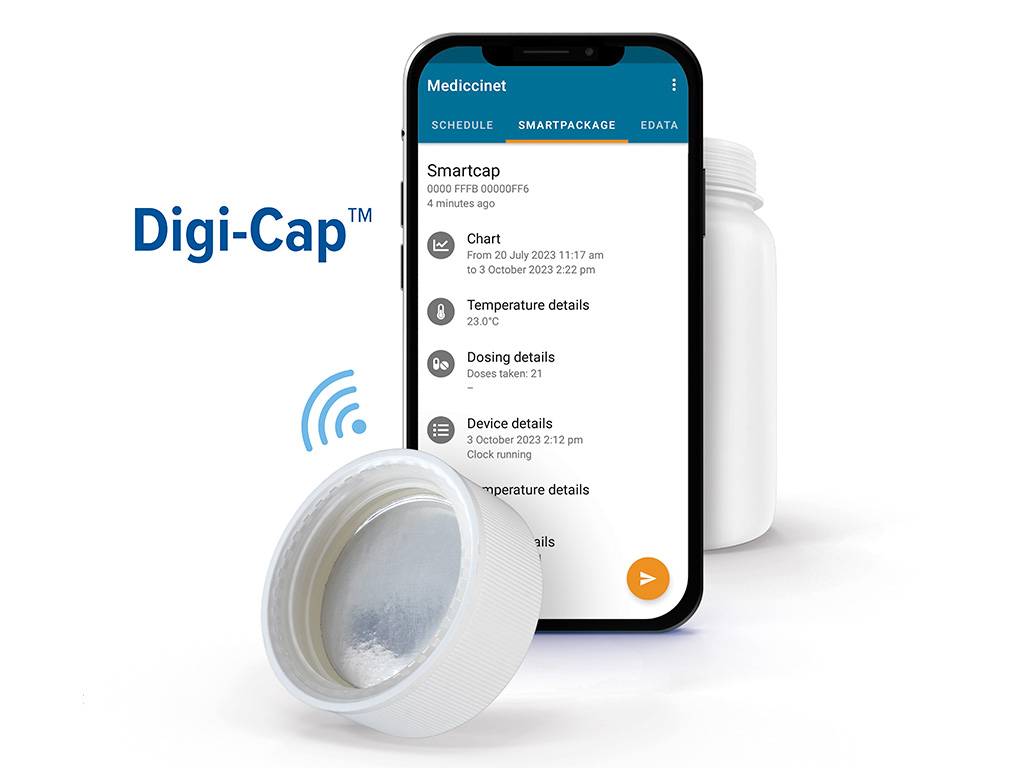November 15, 2023
(press release)
–
Summary The fast development of vaccines in the face of the Covid-19 pandemic demonstrated the skills and expertise of the pharmaceutical industry. However, the speedy response to this global crisis belies the fact that in many cases, the product development process for a new drug or treatment can be very lengthy and costly, with no guarantee that it will be approved for commercialization. One of the stumbling blocks to obtaining approval is an inability to demonstrate a drug’s efficacy. This does not mean a drug is ineffective but could instead be the result of poor adherence preventing the drug from performing to its full potential. The introduction of digital technology into standard plastic closures used in drug trials is a breakthrough that can enhance medicine adherence and provide valuable insights into its effectiveness directly relative to the prescribed regime. Background According to Statista.com, research and development spending in the pharmaceutical industry during 2021 totaled some 238 billion U.S. dollars globally1, with around 5,100 pharmaceutical companies with active R&D pipelines2. While the industry spends more than one fifth of its revenues on R&D projects3, such investments do not necessarily lead to success and profits, with the average return remaining low. Indeed, while figures vary across different therapies, in the USA, only around 14% of products that enter industry-sponsored Phase I clinical trials go on to obtain FDA (Food & Drug Administration) approval.4 A 2018 review of data from the previous 30 years identified the leading cause of study failure as being an inability to demonstrate efficacy.5 In one analysis of 640 Phase III novel therapeutic trials, 54% had failed in clinical development, of which over half (57%) were attributed to inadequate efficacy.6 Nevertheless, research has shown that lack of efficacy is often directly correlated to poor adherence. In a 2012 study of oral FTC/TDC for women (FEM-PrEP), for example, adherence measured by self-report was 83%, compared to just 30% when measured by blood concentrations.7 This stark difference suggests that self-reporting may not accurately reflect actual medication intake. The study returned a statistically insignificant efficacy rate of just 6%, leading researchers to question whether poor medication adherence, rather than drug formulation, could be the issue. To further support this theory, a review of trials for similar products, with varying degrees and methods of adherence support, appeared to show a correlation between adherence and efficacy. These findings prompted FDA reviewers of the dossier to conclude that self-report and pill count were ineffective adherence measures8, helping to shape the development of the 2019 enrichment strategies guidance. This document recognizes that the reliability of patient adherence data should be improved, as it provides valuable safety and efficacy information, and that more attention should be paid to adherence data during regulatory review. Equally significant, poor adherence in clinical trials can have financial implications. Aside from the obvious impact of the failure of a drug to obtain approval, there could be increased costs if a launch is delayed because more patients are needed to demonstrate efficacy or the study needs to be repeated. The Solution Poor medication adherence has been recognized as a long-standing problem in clinical trials, as developers have historically relied on subjective measurements, including pill counting, self-reporting, or invasive techniques, such as tracking product levels in blood or urine. Berry’s Digi-Cap™ makes it possible to measure and report relevant adherence data independently as part of a clinical trial, including the time the package was opened and important temperature information. As a result, drug companies have access to objective data that enables them to assess the efficacy of a drug more accurately. They can also analyze behavioral data to identify compliance or non-compliance, support test results and conclusions, and fine-tune timings for taking the medicine to maximize its effectiveness. The Berry Digi-Cap™ By utilizing digital caps with sensors and connectivity features, healthcare providers and researchers can gather real-time data on actual medication intake, eliminating reliance on self-reporting or subjective measures. A microprocessor incorporated into the closure records patient openings and stores usage history in its memory. In addition, the closure continuously monitors and logs temperature storage levels, which can provide valuable data for research and development. The microprocessor is activated once the patient pushes down to open the closure. It records and stores various parameters, and the recorded information can then be easily transferred via near-field communication (NFC) to external devices such as smartphones and PCs for further viewing and analysis. The data can be uploaded to a patient-facing mobile app, compatible with both Android and iOS platforms, and to web portals for healthcare professionals to review and utilize for optimizing treatment plans. As well as promoting enhanced patient adherence, data collected from Digi-Cap™ can help increase medication effectiveness by providing healthcare professionals with a comprehensive understanding of patient behavior, including missed doses, delayed intake, or inconsistent adherence. The app can also remind patients when to take and how to properly store their medication. Drug companies can add extra features such as LED lights on the closure to help patients stay on schedule with their treatment, for example, by flashing green at the appropriate time. In addition, real-time adherence data can contribute to post-marketing surveillance, enabling pharmaceutical companies to monitor the long-term effectiveness and safety of their medications. Importantly, these technical benefits have been incorporated into the closure without altering its original design, thus maintaining patient familiarity to avoid affecting or influencing usage. The closure is child-resistant and features a fine-ribbed sidewall for enhanced grip, providing ease of use for patients. The push-down and turn child-resistant mechanism ensures product security and clear pictorial opening instructions, further simplifying the patient experience. An audible click feature gives a sound indication of opening for added reassurance. The closure is compatible with 38-400 standard pharma packaging bottles and existing filling lines and can withstand the sealing process. Berry offers a wide range of pill jar bottles in different dimensions and shapes to match the closure. Test and programming software packages are available from third parties for both automatic and manual filling operations. Conclusion With advancements in technology, such as Digi-Cap™, smart packaging solutions can help make patient adherence a modifiable risk factor by providing objective insights for clinical studies, pharmacovigilance, risk evaluation, and mitigation studies. In addition, smart packaging has the potential to enhance cost efficiencies and return on investments by providing the valuable safety and efficacy information needed to progress clinical trials. Learn more about our plastic products and packaging solutions suitable for the global healthcare market. For more information about Digi-Cap™, contact healthcare@berryglobal.com.


* All content is copyrighted by Industry Intelligence, or the original respective author or source. You may not recirculate, redistrubte or publish the analysis and presentation included in the service without Industry Intelligence's prior written consent. Please review our terms of use.




